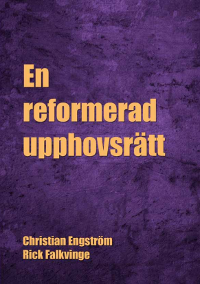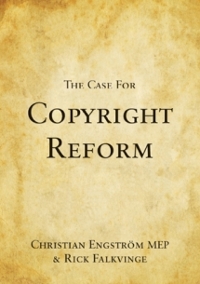
The alternative resolution by the Green, Social Democrat and Left groups calls for fact and figures before deciding on a course of action
Wednesday next week the European Parliament will be voting on the Gallo report on intellectual property enforcement.
Unfortunately, there is a major risk that the parliament will adopt the report, which would be bad news for the Internet community. I am one of the signatories on an alternative resolution submitted by the Green, Social Democrat and Left groups, but it is doubtful if we will be able to get a majority for it. But we will keep on trying until the final vote.
The Gallo report on intellectual property enforcement starts out by noting that data concerning the scale of IPR infringements is inconsistent, incomplete, insufficient and dispersed, and that an objective, independent impact assessment is needed for any additional legislative proposal.
So far, so good. The astronomical fantasy figures provided by the film and record companies are no sound basis for introducing new legislation, and we would urgently need a more fact based approach.
But after having established that we don’t really have the facts and figures to base any new proposals on, the Gallo report proceeds to make recommendations about new laws and stricter enforcement anyway.
The report urges the Commission to ”complete the legislative framework to introduce a set of measures to combat intellectual property infringements”, and to promote ”voluntary” agreements between Internet service providers and rights holders, to enforce copyright online.
Such ”voluntary” agreements between the content industry and Internet service providers have been promoted by some national governments across the EU to address the issue of file sharing by trying to establish national “graduated response” or ”three strikes” mechanisms.
But they are highly problematic, since they go beyond the regulatory framework to establish practices. The creation of “self-regulatory” systems remove core fundamental rights such as the right to a fair trial and the right to privacy. By turning the Internet service providers into police, judge, jury and executioner, transparent and structured democratic decision-making is also sidelined.
Another problem with the Gallo report is that it consistently mixes up non-commercial illegal file sharing with commercial goods counterfeiting. The impact of counterfeiting, particularly with regard to medicines, can be very serious and even life threatening. By contrast, there have been no known deaths as a direct result of unauthorised file sharing. Even if you think that the music kids listen to nowadays is rubbish, it’s not that bad.
If there are improvements that can be made in the way the EU combats counterfeit goods, we Pirates have no objections to that. But pretending that this is the same thing as illegal file sharing is just silly. They are separate issues, that need to be addressed separately.
Today’s copyright legislation is fundamentally out of touch with the times. Since at least 1999, when Napster appeared on the scene, file sharing on the Internet has continued to grow exponentially year by year, despite all efforts to limit it by stricter enforcement measures.
Whether you think that the Internet is the Great Library of Alexandria 2.0 (as we Pirates do), or a modern day equivalent of the Boston strangler (as some rights holders have suggested), we should at least be able to agree on two things: that the enforcement strategies governments have been pursuing for the last decade are not working, and that any new strategies need to be based on facts and reality.
The European Parliament has a chance to play a constructive role in this debate by adopting the alternative resolution that encourages the Commission to start by collecting scientific research regarding intellectual property rights regulation, and to let that data be the starting point for the discussion on how to proceed.
To me, this is the sensible thing in a situation where we are nowhere near a consensus in the parliament as to what we should do.
To complicate things, the Liberal group has also submitted its own alternative resolution. It is shorter than the original Gallo report, which of course is an improvement, but the substance of it is essentially the same as the original Gallo report.
It too mixes up counterfeiting and file sharing, and recommends stricter enforcement measures to be introduced immediately, without waiting for any data or facts to be collected.
The alternative resolution by the Greens (including Pirates), the Social Democrats and the Left acknowledges this, and and leaves it open what we should to until we have more data and have had the time to reflect.
I invite members from all political groups to vote for the Green, S&D and GUE alternative resolution.
The ever stricter enforcement policies of the last decade have not worked, and there is no reason to think that more of the same will work any better. It is time to take a deep breath and start a serious discussion about our options.
The European Parliament has a chance to take a lead role in this discussion. I think we should.
…………
Reference links:
The Gallo report as proposed by the rapporteur (EPP group)
Alternative resolution by the Green, Social Democrat and Left groups
Alternative Resolution by the Liberal group
Previous articles on the Gallo report
Andra som skriver: Henrik Alexandersson
Tags: piratpartiet, eu, politik, informationspolitik
 Christian Engström, former Member of the European Parliament 2009-2014 for Piratpartiet, Sweden
Christian Engström, former Member of the European Parliament 2009-2014 for Piratpartiet, Sweden




the Gallo report consistently mixes up non-commercial illegal(!) private communication with commercial goods counterfeiting.
Illegal private communication, THAT is really something to think about, twise!
Kommentar av steelneck — 16 september 2010 @ 14:40
I can only quote Albert Einstein
Doing the same thing over and over again and expecting different results is the true definition of stupidity.
Kommentar av Stefan — 16 september 2010 @ 15:42
@steelneck:
Yes, it’s quite a bizarre legislation we have right now. But we will change it.
Kommentar av Christian Engström — 16 september 2010 @ 22:50
Yes Christian, _we_ can realise that. I do not think you quite got my point. Many swedish pirates have recently realised that they have to change their languange a bit to get middle-aged people and older to understand the questions the Pirate party is all about. Like the connection between file sharing and mass surveillance of innocent people. This was also the base of my post above. Christian, you are in some cases more than 15 years ahead of most other politicians regarding the subject matter of the pirate party, some of them will die of age without reaching your level. This is the basic reason that many of them will never agree and see things like you do, in the same way that most middle-aged voters do not get it.
Imagine a politician saying that ”We must make filesharing (= piracy) illegal and possible for the police…”, compare that to another politician saying: ”We must make some private communication illegal and possible for the police..” Most people, especially the generation in power, will not see anything wrong with the former. But they will shure see a problem in the latter.
This can sound like nitpicking, but it is very important in establishing the understanding of that connection between file sharing and mass surveillance of innocent people. We are all carrying a backpack with earlier cognitives, previous ”truths” that we filter everything new against to intuitively sort true from false or good from bad. What happens here is that fileshareing allredy has a connection to piracy that is allready established as bad, the connection thus becomes filesharing (something new) = piracy = bad, no harm in making illegal. They have allredy cornered them self mentally and when some one like you, say the thing you do, they end up in cognitive dissonance and start to seek arguments to defend their cognitives.
By just a small change of words, many times 100% synonymous in the context, you will push a completely different set of buttons and use their old cognitives to your advantage and never send them into cognitive dissonance where they have to defend them self mentally.
Kommentar av steelneck — 17 september 2010 @ 16:22
[…] (via unwatched, engström) […]
Pingback av EU-Parlament berät über Verschärfung des Copyrightregimes « 11k2 — 22 september 2010 @ 11:24